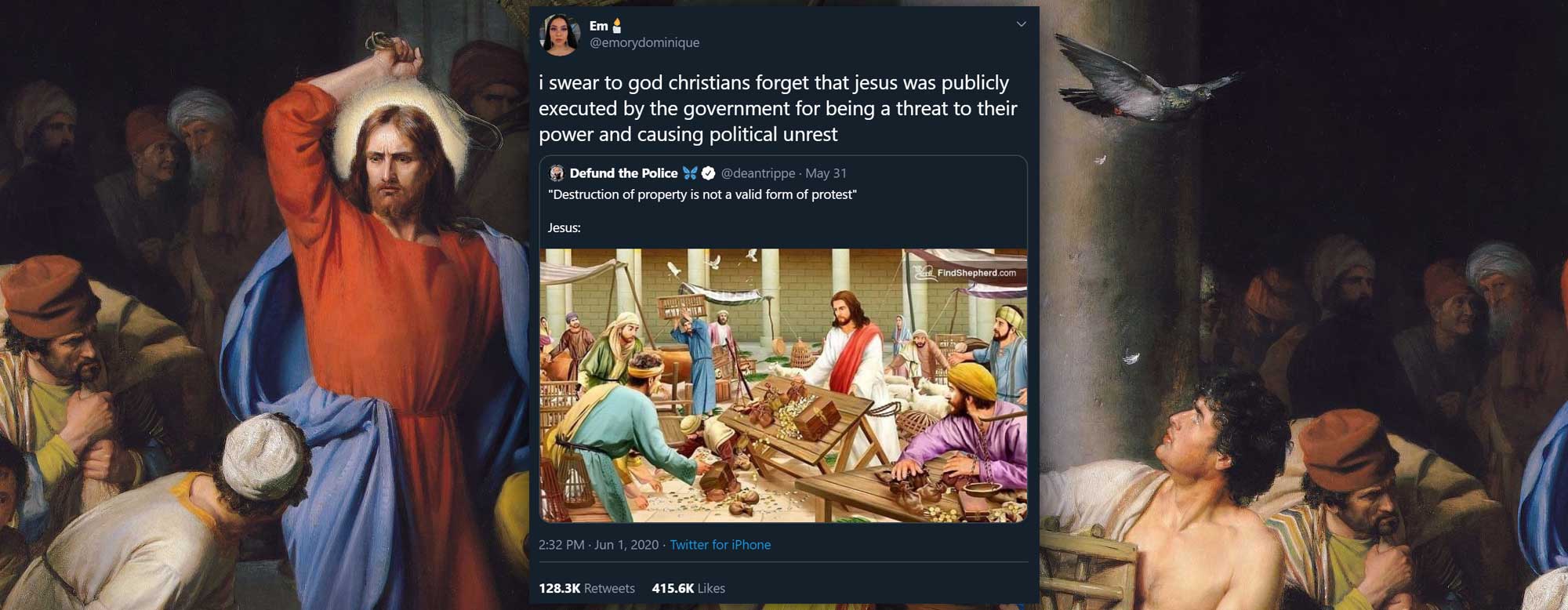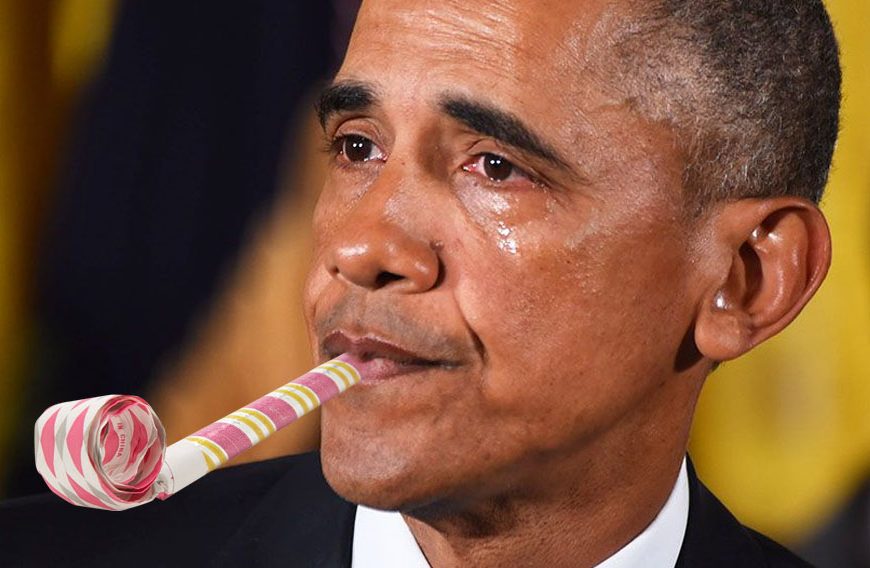Most of us would remember the popular Christian arm bracelets with the acronym ‘WWJD?’ The initials stand for What Would Jesus Do? It was a question that was supposed to remind people to deal with every situation the way Jesus would. One comical response to the question was to suggest that “flipping over tables and chasing people with a whip was within the realm of possibility.”
That is, after all, something Jesus did, right? But is it licence for us to do likewise? Is it OK for us to destroy other people’s property in the name of social justice? It’s a ridiculous question. A really, really ridiculous question, but more than a few ridiculous folks have appealed to Jesus’ “cleansing of the Temple” to justify recent violent and destructive protests. One tweet alone making the case has attracted more than 400k likes and close to 130k retweets in less than 24 hours.
i swear to god christians forget that jesus was publicly executed by the government for being a threat to their power and causing political unrest https://t.co/R56dagrWuy
— Em🕯 (@emorydominique) June 1, 2020
The account of Jesus cleansing the Temple is recorded in Matthew 21:12-13 and John 2:13-17. The apostles tell us that when Jesus arrived in Jerusalem, he entered the Temple to find it in an appalling state. Traders had essentially invaded in order to set up shop and make a profit exchanging money and selling animals for sacrifice.
So, how did Jesus respond to this abuse of the Temple? John tells us he made a whip of cords and drove them all out, along with the animals. He then poured out the coins of the money-changers and overturned their tables.
“Take these things away,” Jesus said according to John’s account. “Do not make my Father’s house a house of trade.”
Matthew recounts Jesus saying, “It is written, ‘My house shall be called a house of prayer,’ but you make it a den of robbers.”
Now, the argument is that Jesus’ actions mean the destruction of property is a valid form of “protest.” But that’s simply not the case, for a number of reasons.
The argument ignores the fact that Jesus was the descendent of King David, and the rightful king of Israel, as Matthew highlights throughout his Gospel. That means, as King, Jesus had every right to cleanse the Temple, just as other kings of Israel had done (e.g. 2 Chr. 29:3-31:21).
Also ignored is the fact that Jesus wasn’t just the king of Israel, he was also the Son of God. That is why he referred to the Temple as “my Father’s house.” In other words, Jesus wasn’t violating anyone’s rights. These people were intruding in his Father’s house. These people were violating his Father’s house.
Furthermore, the argument equates the United States as a nation with the Temple. There were plenty of social injustices in Judea during Jesus’ ministry, and yet we don’t find Jesus working his thousands of followers up into a riotous mob bent on overthrowing that fascist Caesar who is actually ‘literally Hitler.’
Jesus may have driven people and animals out of his Temple, out of his Father’s house, but we don’t see him responding like that to social injustices elsewhere. In fact, a reading of his sermon in Matthew 5 would give the exact opposite impression. Jesus tells his followers to not only pray for their enemies, but to love them (Matt. 5:44).
“I say to you, Do not resist the one who is evil. But if anyone slaps you on the right cheek, turn to him the other also. And if anyone would sue you and take your tunic, let him have your cloak as well. And if anyone forces you to go one mile, go with him two miles.” (Matt. 5:39-41)
When Jesus cleansed his Father’s house, he wasn’t telling us to use violence to resolve social injustices. That is why he didn’t employ that method elsewhere. That is why he never instructed his disciples to employ that method. What Jesus was concerned about was worship. Proper worship. Why is that? Because once we worship God rightly, we can love others rightly.
A proper love for God will translate into a love for others. It will overflow into biblical social justice. As John put it, “He who does not love his brother whom he has seen cannot love God whom he has not seen” (1 Jn. 4:20).
The Temple no longer stands in Jerusalem. Now, thanks to the death and resurrection of Jesus, the Spirit of God dwells within his people, those who have been forgiven for their sins. It’s no surprise then that the New Testament refers to our bodies as the Temple of the Holy Spirit (1 Cor. 6:19).
Just as the Temple in Jerusalem had become corrupt and was in need of cleansing, the same is true for all of us. We all need Jesus to come and cleanse us of our sins, to drive out the corruption and evil inherent to our nature.
When that happens, we begin to truly understand what it is to pray “forgive us our sins as we forgive those who sin against us.” Because if Jesus died and rose from the dead to forgive me of the sins I’ve committed against him, how could I resent or punish others for the sins they’ve committed against me?
“This is a gracious thing, when, mindful of God, one endures sorrow while suffering unjustly. For what credit is it if, when you sin and are beaten for it, you endure? But if you do good and suffer for it you endure, this is a gracious thing in the sight of God. For to this you have been called, because Christ also suffered for you, leaving you an example, so that you might follow in his steps. He committed no sin, neither was deceit found in his mouth. When he was reviled, he did not revile in return; when he suffered, he did not threaten, but continued entrusting himself to him who judges justly.” (1 Pet. 2:19-23)


















